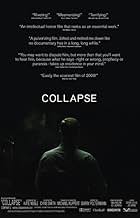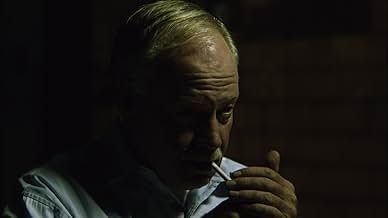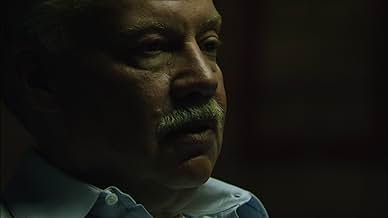Agrega una trama en tu idiomaA documentary on Michael Ruppert, a police officer turned independent reporter who predicted the current financial crisis in his self-published newsletter, From the Wilderness.A documentary on Michael Ruppert, a police officer turned independent reporter who predicted the current financial crisis in his self-published newsletter, From the Wilderness.A documentary on Michael Ruppert, a police officer turned independent reporter who predicted the current financial crisis in his self-published newsletter, From the Wilderness.
- Dirección
- Guionista
- Elenco
- Dirección
- Guionista
- Todo el elenco y el equipo
- Producción, taquilla y más en IMDbPro
Opiniones destacadas
I would surely say - the most important movie for the 21st century man.
We live in a fairytale where everybody has a hope that the ''good'' will overcome the ''evil'' no matter how bad it is, because it will be better... in the end that's the way fairy tales end, don't they? The ugly truth is that no magical wonderland exists, there is only now and here and this movie shows you WHAT ACTUALLY IS NOW AND HERE.
Ruppert hits us right away with peak oil, arguing that though actual supplies have been kept hidden by governments, even Saudi Arabia, which has more than anybody, is starting to run out, and we're clearly now on the down slope of the bell curve. He says no substitute will really work, because all the alternative energy sources require too much energy themselves to produce. The planet's infrastructure is going to shut down; it's just a matter of time. Parallel to this is economic collapse, and he predicted the present crisis -- but expected it a year or so earlier. (Mighn't he be jumping the gun a little on this larger collapse?)
Ruppert is a survivalist, warning us all to live locally. He compares the fates of North Korea vs. Cuba when they lost the Soviet oil lifeline: Korea, a monolithic dictatorship, took a terrible hit. So did Cuba, but people pulled together there, raised crops locally in every available spot of land, and soldiered through so well they're now eating better than ever. He would have us take the same route: raise our own food, and horde gold -- the actual metal, not paper certificates -- and organic seeds, which in a world stripped of supply will become currency.
Ruppert is a smoker, and Smith doesn't hesitate to show every time he lights up. This looks like a marathon, and the interview -- with challenging, skeptical questions off camera from the director from time to time, not that this overconfident autodidact type ever wavers -- is so intense Ruppert actually breaks down and weeps more than once at the hopelessness of it all.
Smith's film is effective, and if it leaves you in some doubt whether the man is a kook or a visionary maybe that's part of the sense of radical unease you may justifiably feel walking out of the theater. Though Ruppert is made to seem both knowing and deranged, his talk is smart and well-informed. Clearly fossil fuels are finite. It all depends on transportation; it all depends on electricity. Without oil, these shut down. If seven gallons of oil go into the making of every tire, how are we going to make a whole new set of cars that run on something else? What about plastics? What about overpopulation? Ethanol is a sick joke, clean coal a lie. Even wind and solar power won't be possible because we won't have the energy to set up the power sources to utilize them. Global warming is just the planet's way of crying "uncle." When oil runs out, we'd better be ready before the infrastructures all collapse, or it's going to be hard going. We've got to downsize. It won't be easy.
It's rare that anybody thinks things through this far. No wonder the tears come. They come when he thinks of Barack Obama, a smart, good, honest man, he says, but someone so locked into the systems that we can't look to him for help. And that's very, very sad. The world's last, best hope is an illusion. (These are just a few of Ruppert's points: into these 82 minutes he condenses the fruits of decades of independent thought and study.)
Smith asks Ruppert what spiritual beliefs sustain him and he simply quotes the Bible: "money is the root of all evil." He asserts that we must find ways to live without growth and profit as guiding motives. The pervasive pursuit of money is the great, tragic human flaw.
This is an intensified and distilled Michael Ruppert, very effective but a bit misleading: he has other facets. In another setting glimpsed in the film but available in full on YouTube you can see Ruppert in a suit and tie giving a rambling, self-indulgent slide lecture full of many of the same interesting facts he likes to cite, including the government's reliance on drug trading, but very different in feeling and veering (though he denies this elsewhere) into 9/11 Truth territory. Collapse ends with captions noting that Ruppert, whose only friend seems to be his faithful dog, is having trouble paying his rent and may be evicted from his Culver City place.
But again on YouTube you find him being interviewed recently in Oregon, where he has moved, looking and sounding sunny and grounded and socially connected. If he's a kook, he has lots of friends, some of them quite respectable, and "Peak Oil" is a rallying cry for many. The YouTube videos show Ruppert isn't always the intense nut case Smith gives us. He suffers, he thinks too much, but he can have fun; he can talk without a smoke. He feels Ashland is a place among many (including much of South America) where sustainability will be possible when the paradigm shift comes. The end of he world won't be the end of the world. This may not totally convince you, but it will scare you. Rupert protests in Smith's movie that he deals in conspiracy facts, not conspiracy theories. He just may be right.
However, gloomy is one thing. Being deadly accurate in nearly all predictions is another thing altogether. Ruppert, and his team at From the Wilderness (his newsletter) have been bang on the money when it came to oil prices, housing prices, and of course the collapse of the US housing market, and in other areas as well including drugs, the CIA and 9/11 itself. Ruppert being an ex LAPD narcotics officer who was born into an intelligence family, has had experience in seeing truth where others bury their heads in the sand. When he tried to bring to light evidence that the CIA was dealing drugs within the USA, he was shot at and forced off of LAPD. This was only the beginning of his investigative career, and of the vicious repercussions he suffered because of it. In November of 2004, his book "Crossing the Rubicon: The Decline of the American Empire and the End of the Age of Oil" went largely unnoticed, even though it could serve as a final nail in Dick Cheney's political coffin concerning his culpability for 9/11. Ruppert has said, "This is a book that I, as a detective, would... drop in the lap of a DA and say, 'I want a filing for murder, premeditated, first degree, multiple counts with special circumstances." The best part: he makes no mention of bombs in buildings, or holes in the pentagon, or molten metal, but merely treats the case as another crime to be pieced together and solved. His conclusions are staggering.
And in light of this, to hear what he predicts is yet to come is guaranteed send a chill down your spine, even if you don't believe him. And what does he predict? Nothing short of the collapse of industrialized civilization itself. How could this ever happen? Quite simply, the world runs out of oil. Since everything we do is dependent upon oil... well it's probably best if I let Ruppert speak for himself.
The film plays like one of Ruppert's more impassioned talks, albeit with some cinematography added in to keep the eye amused. We are in an undefined space that looks like a bunker, or an interrogation room. Ruppert sits in a chair, smoking cigarettes (presumably to calm his nerves, or as he's been known to say "I smoke as many cigarettes as I want to, but not nearly as many as the movie would have you believe") and tells us what's on his mind. And by the time you're done seeing "Collapse" it'll be on your mind too... no matter how hard you try not to believe it.
What makes "Collapse" so much more powerful than the angry rants and shenanigans of Michael Moore is that while Moore may be passionate about what he's talking about, it's clear that Ruppert is more than passionate... he's scared to death. What's worse, and also unlike Moore who has received greater publicity than many fiction filmmakers, Ruppert has suffered from a kind of Cassandra syndrome for sometime. His writings and speeches are prophetic and yet, until recently, he has gone mostly unnoticed by the majority of people. Despite this, he's cracked open some of the biggest cases of all time: the CIA dealing drugs, empirical evidence that Dick Cheney was directly responsible for thousands of deaths on 9/11, and most recently, the collapse of the global housing market. It's not difficult to picture a similar but more ancient voice shouting "Don't let the horse through the gates of Troy! It will bring ruin!" only to be met with violence and humiliation.
As is true with so many visionaries, Mike Ruppert is just now beginning to be heard... and like so many useful visions, the realization is coming too late.
I would like to have had more info on a lot of his quotes but I guess that would likely take an 80 minute documentary into like 3 or 4 hours (which I wouldn't have minded). I might just buy some if his books to take a look to see how much more in depth he gets on most of the topics he covers in this documentary.
For me, watching this, it was like it's about time. What I mean by that is finally someone who doesn't come across as a street corner preacher or a bona fide nut. This guy is just talking about real issues that matter, or at least they should matter.
It seems I need to continue my comment based on IMDb policy of ten lines. That doesn't impress me as necessary, but I see the decision isn't mine. It's a great film, go and watch it. Anyway, hopefully this is enough to satisfy the rules. Why the needless wordiness IMDb? I liked the film and the participant, that isn't enough said? I'll bet many reviews never get posted based on the ambiguous ten lines rule.
¿Sabías que…?
- TriviaAccording to director, Chris Smith, they initially agreed the primary subject was supposed to be the CIA's connections to drug smuggling within the Iran-Contra affair, specifically Ruppert's collaboration with Pulitzer Prize-winning reporter Gary Webb's mid-1990's investigative series, "Dark Alliance." But Ruppert didn't want to talk about the CIA. Instead, he wanted to talk about peak oil, and its critical implications for the future.
- Citas
Michael Ruppert: It's kind of sad because we as a species have become so disconnected from the Earth. We don't have any real contact with the Earth. We don't have any sense of its functions, its feeling, its seasons, its timings.
- ConexionesReferenced in Film Junk Podcast: Episode 235: TIFF Report, Part 1 (2009)
- Bandas sonorasCollapse
Performed by Karli Larsen, Didier Leplae, Joe Wong
Selecciones populares
- How long is Collapse?Con tecnología de Alexa
Detalles
Taquilla
- Total en EE. UU. y Canadá
- USD 46,964
- Fin de semana de estreno en EE. UU. y Canadá
- USD 7,800
- 8 nov 2009
- Total a nivel mundial
- USD 46,964
- Tiempo de ejecución1 hora 22 minutos
- Color
Contribuir a esta página



















